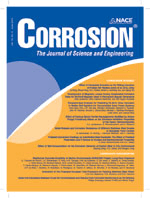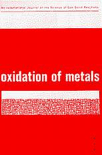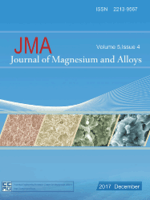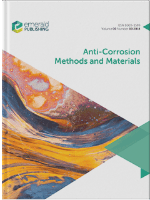
npj Materials Degradation
Scope & Guideline
Leading the Charge in Sustainable Materials Engineering
Introduction
Aims and Scopes
- Corrosion Mechanisms and Prevention:
Research on the fundamental mechanisms of corrosion in various environments, including electrochemical processes, localized corrosion, and the role of environmental factors. This area also includes studies on corrosion inhibitors and protective coatings. - Material Characterization and Performance:
Extensive analysis of materials' properties, including mechanical, thermal, and electrochemical characteristics, especially under degradation conditions. This encompasses both experimental and computational methods. - Biodegradation and Environmental Interactions:
Exploration of how materials interact with biological systems and environmental conditions, particularly in relation to biodegradation processes and microbiologically influenced corrosion. - Innovative Coatings and Treatments:
Development of novel materials and surface treatments aimed at enhancing corrosion resistance, such as smart coatings, self-healing materials, and nanocomposite coatings. - Machine Learning and Computational Approaches:
Utilization of machine learning and computational techniques to predict corrosion behavior, optimize materials design, and analyze degradation processes.
Trending and Emerging
- Machine Learning in Corrosion Prediction:
The application of machine learning techniques to predict corrosion behaviors and optimize materials is trending. This reflects a growing interest in data-driven approaches to enhance understanding and management of material degradation. - Bioinspired and Self-Healing Materials:
There is an increasing focus on developing bioinspired materials and self-healing coatings that can autonomously repair damage. This trend is driven by the need for sustainable and long-lasting materials in various applications. - Advanced Coating Technologies:
The exploration of advanced coating technologies, including multifunctional and nanostructured coatings, is on the rise. These coatings aim to provide enhanced protection against corrosion and degradation, often incorporating novel materials and methodologies. - Environmental Impact and Sustainability:
Research addressing the environmental impact of materials and degradation processes is emerging as a vital theme, reflecting a broader societal push towards sustainable practices in materials engineering. - Corrosion in Additive Manufacturing:
The study of corrosion behaviors in additively manufactured components is gaining prominence, as this technology becomes more prevalent in various industries, necessitating a better understanding of the unique degradation mechanisms involved.
Declining or Waning
- Traditional Corrosion Testing Methods:
There is a noticeable decrease in publications focused on conventional corrosion testing methods, as newer technologies and computational models gain popularity and provide more efficient and insightful data. - Generalized Studies on Common Alloys:
Research on widely used alloys without specific contextual applications is declining. The emphasis is shifting towards more specialized and innovative materials that meet specific environmental and operational challenges. - Surface Treatment Techniques:
Studies on classical surface treatment techniques are becoming less frequent, as research moves towards more advanced and multifunctional coatings that integrate properties such as self-healing and environmental responsiveness.
Similar Journals

CORROSION
Pioneering Research in Corrosion and Materials ScienceCORROSION is a prestigious journal published by the Natal Association of Corrosion Engineers, dedicated to advancing the understanding of corrosion phenomena in various materials across multiple industries. With a strong commitment to high-quality research, it has established itself as a key resource in the fields of Chemical Engineering, Chemistry, and Materials Science, as reflected in its Q3 ranking in the 2023 category quartiles. This journal, retaining its relevance since 1969, serves as a platform for innovative studies and findings that address fundamental and applied aspects of corrosion, vital for professionals engaged in material selection and integrity management. Through access to state-of-the-art research, CORROSION significantly contributes to the safety, sustainability, and efficiency of engineering practices worldwide. Researchers, professionals, and students alike can benefit from the insights offered by this journal, driving forward the quest for innovative solutions in corrosion management.

Portugaliae Electrochimica Acta
Unveiling New Dimensions in Electrochemical SciencePortugaliae Electrochimica Acta is a distinguished journal dedicated to the field of electrochemistry, published by the SOCIEDADE PORTUGUESA ELECTROQUIMICA. With a notable ISSN of 0872-1904, this journal serves as a vital resource for researchers, professionals, and students interested in advancing their understanding of electrochemical processes. Though it is currently categorized in Q4 in the 2023 Electrochemistry rankings, the journal contributes significantly to the academic discourse from its base in Coimbra, Portugal. The journal's timeline spans actively from 2008 to 2025, ensuring a sustained engagement with emerging research. While the journal does not offer open access options, it remains an authoritative source noted for promoting innovative electrochemical research and fostering academic connections within the discipline. Researchers are encouraged to submit their findings and explore the latest contributions to this expanding field.

OXIDATION OF METALS
Unveiling the Secrets of Oxidation ProcessesOXIDATION OF METALS, published by SPRINGER/PLENUM PUBLISHERS, stands as a pivotal journal in the fields of Inorganic Chemistry, Materials Chemistry, and Metals and Alloys. Established in 1969, it has consistently contributed to advancing knowledge and research on the oxidation processes in metals, essential for various industrial applications and theoretical frameworks. With an impact factor that reflects its respected position—ranked Q2 in key scientific categories—this journal facilitates cutting-edge discourse among researchers and practitioners alike. The journal is committed to open access, ensuring that groundbreaking research on metals’ behavior and resistance to oxidation is available to a broader audience, enhancing collaboration and innovation. Spanning over five decades, OXIDATION OF METALS continues to be a crucial resource for scholars and professionals aiming to stay at the forefront of materials science and engineering.

Journal of Magnesium and Alloys
Transforming Materials Science Through Open AccessThe Journal of Magnesium and Alloys is a prestigious, peer-reviewed academic publication dedicated to advancing the field of materials science, particularly focusing on magnesium and its alloys. Published by KEAI PUBLISHING LTD since 2013, this Open Access journal enables unrestricted dissemination of research findings, enhancing global collaboration among researchers, professionals, and students. With an ISSN of 2213-9567 and a significant impact factor, it has established itself in the upper quartiles (Q1) of both the Mechanics of Materials and Metals and Alloys categories, ranking #3 out of 176 and #9 out of 398 respectively according to Scopus. The journal aims to provide a forum for the latest advances in the understanding, production, and application of magnesium alloys, fostering innovation and sustainable practices within the materials engineering community. Based in Beijing, China, the journal is committed to bridging gaps in current knowledge and driving future research directions through its high-quality publications.

SURFACE ENGINEERING AND APPLIED ELECTROCHEMISTRY
Transforming Surfaces, Empowering IndustriesSURFACE ENGINEERING AND APPLIED ELECTROCHEMISTRY, published by PLEIADES PUBLISHING INC, stands as a pivotal resource in the realms of engineering and materials science. With an ISSN of 1068-3755 and an E-ISSN of 1934-8002, this journal encompasses an extensive scope that includes industrial applications, and innovative surface treatments, fostering advancements in the fields of Industrial and Manufacturing Engineering, Surfaces, Coatings and Films, and Surfaces and Interfaces. Recognized for its contributions, it currently holds a Q3 classification in both Industrial and Manufacturing Engineering and Surfaces, Coatings and Films, alongside a Q4 ranking in Surfaces and Interfaces for the year 2023. Despite its competitive standings, the journal encourages inclusive dialogue and dissemination of research from a global community—making it an essential platform for researchers and professionals dedicated to surface technologies and applied electrochemistry. Potential contributors and readers can expect a comprehensive exploration of techniques and innovations, reinforcing the journal's commitment to bridging theory and practical application in these dynamic fields.

Journal of Coatings Technology and Research
Pioneering Research in Coatings and Materials ScienceThe Journal of Coatings Technology and Research, published by Springer, stands as a vital resource for researchers and professionals in the fields of materials science and chemistry. With an ISSN of 1547-0091 and an E-ISSN of 1935-3804, this journal is recognized for its significant contributions to the study of coatings technology, encompassing diverse aspects from surfaces and interfaces to colloids and surface chemistry. Currently holding a 2023 Impact Factor that places it in the Q2 and Q3 quartiles across several categories—including Chemistry and Colloid and Surface Chemistry—the journal serves as an essential platform for disseminating innovative research. Its accessibility options cater to a broad audience, ensuring that both established scholars and emerging researchers can engage with the latest findings. Since its inception in 2004, the journal has continued to foster advancements in coatings technologies, promoting sustainable practices and novel applications across industries.

China Surface Engineering
Connecting researchers for global surface solutions.China Surface Engineering is a prominent academic journal dedicated to the field of materials science, with a specific emphasis on surfaces, coatings, and films. Published by the Chinese Association of Science and Technology (CAST), this journal serves as an essential platform for researchers, professionals, and students seeking to disseminate knowledge and advancements in surface engineering technologies and innovative applications. With its ISSN 1007-9289 and E-ISSN 1007-9289, it has established a distinct presence since its convergence in 2016, and continues to evolve in the rapidly advancing materials science landscape through to 2024. Although currently categorized in the Q4 quartile of its field, with a Scopus ranking of #103 out of 132 in Surfaces, Coatings and Films, the journal plays a critical role in contributing to the discourse surrounding surface treatment and modification, fostering advancements that are pivotal for industrial applications. As an avenue not only for knowledge transfer but also for collaboration among scientists worldwide, China Surface Engineering is crucial for anyone engaged in research or practical applications in this domain.

Corrosion Science and Technology-Korea
Unveiling breakthroughs in electrochemistry and surface coatings.Corrosion Science and Technology-Korea, published by the CORROSION SCIENCE SOC KOREA, is a pivotal journal dedicated to the exploration and advancement of knowledge in corrosion science, particularly within the context of materials performance and maintenance. Established to foster innovation and collaboration among scholars in South Korea and beyond, this journal focuses on areas such as electrochemistry, metal alloys, and surface coatings, catering to a diverse audience of researchers, professionals, and students in materials science and chemistry. Despite its current quartile rankings, including Q4 in Electrochemistry and Q3 in various materials-related categories, the journal aims to enhance its visibility and impact in the scientific community by publishing high-quality research and reviews. With its ISSN 1598-6462 and E-ISSN 2288-6524, Corrosion Science and Technology-Korea is committed to contributing to the understanding and mitigation of corrosion issues, thereby promoting sustainability and longevity in engineering applications.

Coatings
Connecting Research and Application in Coatings.Coatings, published by MDPI, is a premier open-access journal dedicated to the science and technology of coatings, surfaces, and films. Since its inception in 2011, the journal has rapidly established its significance in the fields of Materials Chemistry and Surfaces and Interfaces, currently holding a respectable Q2 ranking in various relevant categories as of 2023. Based in Basel, Switzerland, Coatings aims to disseminate high-quality, peer-reviewed research, fostering innovative advancements in coating technologies and their applications. The journal's impact is further reflected in its position within Scopus rankings, where it has achieved notable percentiles across multiple disciplines. As an advocate for open access, Coatings ensures worldwide availability of research findings, making it an essential resource for researchers, industry professionals, and students alike, striving to advance knowledge in surface engineering and material science.

ANTI-CORROSION METHODS AND MATERIALS
Exploring Advanced Materials for Lasting ProtectionANTI-CORROSION METHODS AND MATERIALS, published by EMERALD GROUP PUBLISHING LTD, is a leading journal in the fields of chemical engineering and materials science, focusing on innovative methods and materials for corrosion prevention and control. With its ISSN 0003-5599 and E-ISSN 1758-4221, this esteemed journal has been contributing to the academic community since its inception in 1954 and continues to be relevant through 2024. Despite its Q3 ranking in both Chemical Engineering and Materials Science categories, the journal plays a critical role in disseminating valuable insights and advancements, catering to a diverse audience of researchers, professionals, and students. Although the journal does not offer open access options, it remains a significant resource for those seeking to enhance their understanding of corrosion methodologies and to implement best practices in various industrial applications. With the recent Scopus rankings reflecting its impact, ANTI-CORROSION METHODS AND MATERIALS stands as a pivotal element of scholarly discourse in mitigating corrosion challenges in modern materials.